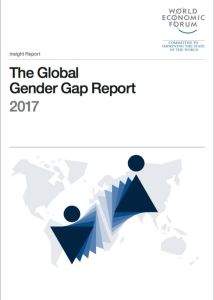How would you like to use getAbstract?
We help you to meet your learning objectives.
getAbstract offers a free trial to qualifying organizations that want to empower their workforce with curated expert knowledge.
Enjoy 3 days of full online access to 27,000+ summaries
Risk-free: no credit card is required. After three days, your trial will expire automatically.
Join getAbstract to access the summary!

Join getAbstract to access the summary!
World Economic Forum
The Global Gender Gap Report 2017
World Economic Forum, 2017
What's inside?
What do Iceland and Rwanda have in common? Both are leaders in gender parity .
- 0.5×
- 0.75×
- 1×
- 1.25×
- 1.5×
- 1.75×
Editorial Rating
The rating – what does it mean?
At getAbstract, we summarize books* that help people understand the world and make it better. Whatever we select for our library has to excel in one or the other of these two core criteria:
Enlightening – You’ll learn things that will inform and improve your decisions.
Helpful – You’ll take-away practical advice that will help you get better at what you do.
We rate each piece of content on a scale of 1–10 with regard to these two core criteria. Our rating helps you sort the titles on your reading list from solid (5) to brilliant (10). Books we rate below 5 won’t be summarized. Here's what the ratings mean:
10 – Brilliant. A helpful and/or enlightening book that, in addition to meeting the highest standards in all pertinent aspects, stands out even among the best. Often an instant classic and must-read for everyone.
9 – Superb. A helpful and/or enlightening book that is extremely well rounded, has many strengths and no shortcomings worth mentioning.
8 – Very good. A helpful and/or enlightening book that has a substantial number of outstanding qualities without excelling across the board, e.g. presents the latest findings in a topical field and is written by a renowned expert but lacks a bit in style.
7 – Good. A helpful and/or enlightening book that combines two or more noteworthy strengths, e.g. contains uncommonly novel ideas and presents them in an engaging manner.
6 – Notable. A helpful and/or enlightening book that stands out by at least one aspect, e.g. is particularly well structured.
5 – Solid. A helpful and/or enlightening book, in spite of its obvious shortcomings. For instance, it may offer decent advice in some areas while being repetitive or unremarkable in others.
*getAbstract is summarizing much more than books. We look at every kind of content that may matter to our audience: books, but also articles, reports, videos and podcasts. What we say here about books applies to all formats we cover.
Qualities
- Analytical
- Innovative
- Eye Opening
Qualities
While the rating tells you how good a book is according to our two core criteria, it says nothing about its particular defining features. Therefore, we use a set of 20 qualities to characterize each book by its strengths:
Applicable – You’ll get advice that can be directly applied in the workplace or in everyday situations.
Analytical – You’ll understand the inner workings of the subject matter.
Background – You’ll get contextual knowledge as a frame for informed action or analysis.
Bold – You’ll find arguments that may break with predominant views.
Comprehensive – You’ll find every aspect of the subject matter covered.
Concrete Examples – You’ll get practical advice illustrated with examples of real-world applications or anecdotes.
Controversial – You’ll be confronted with strongly debated opinions.
Eloquent – You’ll enjoy a masterfully written or presented text.
Engaging – You’ll read or watch this all the way through the end.
Eye opening – You’ll be offered highly surprising insights.
For beginners – You’ll find this to be a good primer if you’re a learner with little or no prior experience/knowledge.
For experts – You’ll get the higher-level knowledge/instructions you need as an expert.
Hot Topic – You’ll find yourself in the middle of a highly debated issue.
Innovative – You can expect some truly fresh ideas and insights on brand-new products or trends.
Insider’s take – You’ll have the privilege of learning from someone who knows her or his topic inside-out.
Inspiring – You’ll want to put into practice what you’ve read immediately.
Overview – You’ll get a broad treatment of the subject matter, mentioning all its major aspects.
Scientific – You’ll get facts and figures grounded in scientific research.
Visionary – You’ll get a glimpse of the future and what it might mean for you.
Well structured – You’ll find this to be particularly well organized to support its reception or application.
Recommendation
Even as global economic growth picks up steam, women continue to occupy a distant back seat when it comes to occupational participation and political clout. While gender parity would broaden the labor pool and provide an economic shot in the arm for many countries, progress in closing the gender gap has sputtered, according to the 2017 edition of the World Economic Forum’s insightful report. But nations achieving improvements outnumber those that have regressed – offering cause for optimism. getAbstract recommends this study’s eye-opening findings to policy experts and business leaders.
Summary
About the Author
The World Economic Forum is an independent global organization dedicated to improving the world.









Comment on this summary